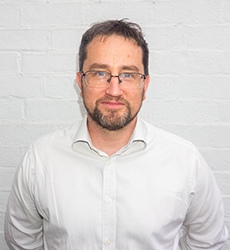Dr Owen Driskell
What is your job title?
My job title is Clinical Academic Sciences Lead at the National School for Healthcare Science.
Which NHS and academic institutions did you work for?
I worked as a Clinical Biochemist for the University Hospitals of North Midlands NHS Trust and the Institute for Science and Technology in Medicine (Keele University).
What do you like about being a clinical academic?
Working as a clinical academic allows me to satisfy my inclination to work things out and understand why things are the way they are. It gives me a great deal of satisfaction to know that my work is part of informing how things are done and I’m not just doing as others decide things need to be done. It also allows for meeting a great number of interesting people and through that broadening my horizons of where our work fits into the wider world of healthcare.
Can you briefly describe how you became and developed as a clinical academic?
I did my clinical training as a Clinical Biochemist after having done a PhD and so I had experience and a continued interest in research going into my clinical career. I was fortunate to train with a supervisor who was a clinical academic. This meant through the course of my training I built links and worked with the research institute that neighboured our NHS laboratories. Because of these connections I was lucky enough to work with my supervisor and the institute to secure an NIHR Healthcare Scientist Training Fellowship.
Give one example of where your work has changed practice?
The work we published was picked up by the National Atlas for Variation for Diagnostics 2013. We had identified evidence of both excessive over testing and under testing for HbA1c in the management of patients with Diabetes Mellitus which impacted on their care. Citing our, work the National Atlas for Variation recommended commissioners needed to audit the frequency of measurement of HbA1c. Work on reducing unnecessary variation in practice is now wide spread with the GIRFT initiatives across healthcare. https://www.england.nhs.uk/rightcare/products/atlas/
What advice would you give to a healthcare scientist who is an aspiring clinical academic?
Work to understand your local environment in terms of who are the people who can help you do things and open doors, whose support do you need, who the enthusiasts are and what links to active research already exist. And do the same in advance when researching for potential job changes. The more you know the more you can plan how your research ambitions can and could fit in with what is already going on and what the opportunities there might be.
